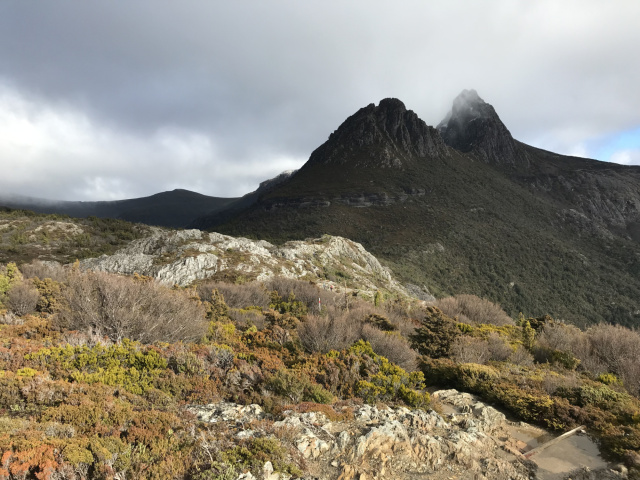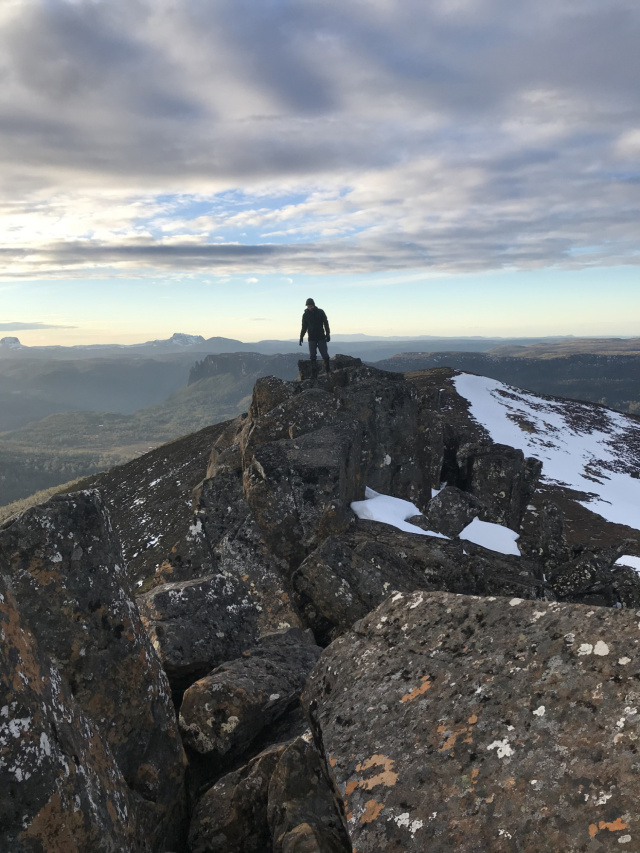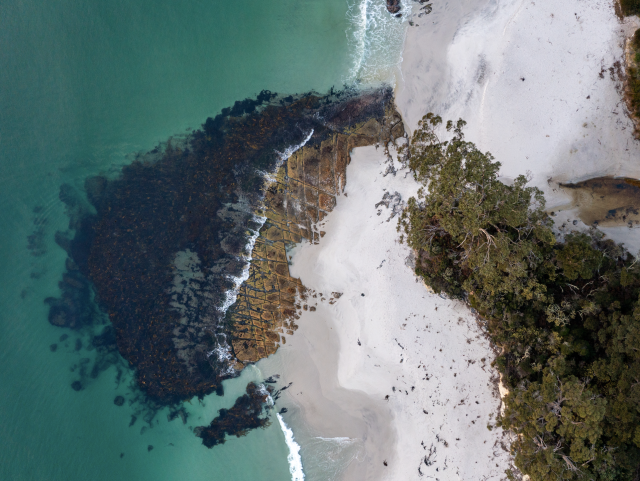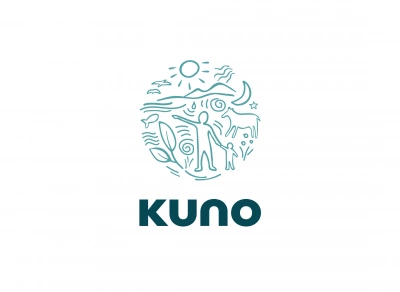Gerard Castles on place
I think like a lot of Tasmanians I just grew up in the bush. I grew up on a dairy farm on the northwest coast of Tasmania. We had bush on the land. So I grew up as a kid just wandering through the bush and then gradually over time that meant going further and further. Then as I grew up we started to go out overnight up into the reserve as we called it, up into Cradle, and I just developed a love for the outdoors and being out.
I think it was the freedom and the sense of otherness. There was something about it just being out there, that you really felt you were in contact with something special. When you're young, you don't think of it as being an aesthetic or spiritual thing. You just love it. And the whole idea of being out with your friends, going away overnight, lighting a campfire, as you did then, and sitting around and talking about life and where you'd been and what you're doing was just absolutely beautiful.

Behind Sheffield where our farm was on the northwest coast, we started climbing Mount Rowland and there was something about being up on top of that that was just amazing. And then when we started to visit the area around Cradle and then the first time I did the Overland Track, that was just an amazing experience to be away not only overnight or for a day but to be away for six or seven days travelling through the overland track and seeing those mountains and being on top of them I realised it was something incredibly special.
I really do think it was a sense of otherness and I'm conscious of the fact too that a lot of people find something very special about being out in the wild in the bush. One of the things that happened actually later in life after growing up on the coast, I came down to Uni. I ended up in history, and for my history thesis I wrote my thesis on a thing called the Scenery Reservation Board which is a forerunner of National Parks and Wildlife in Tasmania, and when I researched that and wrote about it, it was really interesting to find out that there were people who talked about the aesthetic and spiritual value of wilderness but also there are people who perhaps didn't have that language but they felt it.

You can just love being out in the highlands of Tasmania and fishing, deer hunting, traveling around, walking, whatever it is, but you can love the wild. I think it's incredibly important. I think it's part of what makes us us. And I think First Nations people talk about this as being an intrinsic part of their being. And I think for all of us, place is part of what gives us our soul. And on somewhere like Bruny [Island], people struggle to find the words other than the great authors like Richard Flanagan. A lot of us struggle to find the words to describe what it means, but it's important and it makes us who we are and it's something deep in our spirit as a human to be connected to place.
I think you know when you lose it and I think a lot of us take it for granted so that you love a place you might love being there and going there for years or perhaps even many years or perhaps generations and you actually feel it when that is threatened or lost. I think it's really important for us to fight for it, to preserve it and to be able to pass it on to multiple generations.

And I think for all of us, place is part of what gives us our soul.

Kuno
I think like a lot of Tasmanians I just grew up in the bush. I grew up on a dairy farm on the northwest coast of Tasmania. We had bush on the land. So I grew up as a kid just wandering through the bush and then gradually over time that meant going further and further. Then as I grew up we started to go out overnight up into the reserve as we called it, up into Cradle, and I just developed a love for the outdoors and being out.
I think it was the freedom and the sense of otherness. There was something about it just being out there, that you really felt you were in contact with something special. When you're young, you don't think of it as being an aesthetic or spiritual thing. You just love it. And the whole idea of being out with your friends, going away overnight, lighting a campfire, as you did then, and sitting around and talking about life and where you'd been and what you're doing was just absolutely beautiful.

Behind Sheffield where our farm was on the northwest coast, we started climbing Mount Rowland and there was something about being up on top of that that was just amazing. And then when we started to visit the area around Cradle and then the first time I did the Overland Track, that was just an amazing experience to be away not only overnight or for a day but to be away for six or seven days travelling through the overland track and seeing those mountains and being on top of them I realised it was something incredibly special.
I really do think it was a sense of otherness and I'm conscious of the fact too that a lot of people find something very special about being out in the wild in the bush. One of the things that happened actually later in life after growing up on the coast, I came down to Uni. I ended up in history, and for my history thesis I wrote my thesis on a thing called the Scenery Reservation Board which is a forerunner of National Parks and Wildlife in Tasmania, and when I researched that and wrote about it, it was really interesting to find out that there were people who talked about the aesthetic and spiritual value of wilderness but also there are people who perhaps didn't have that language but they felt it.

You can just love being out in the highlands of Tasmania and fishing, deer hunting, traveling around, walking, whatever it is, but you can love the wild. I think it's incredibly important. I think it's part of what makes us us. And I think First Nations people talk about this as being an intrinsic part of their being. And I think for all of us, place is part of what gives us our soul. And on somewhere like Bruny [Island], people struggle to find the words other than the great authors like Richard Flanagan. A lot of us struggle to find the words to describe what it means, but it's important and it makes us who we are and it's something deep in our spirit as a human to be connected to place.
I think you know when you lose it and I think a lot of us take it for granted so that you love a place you might love being there and going there for years or perhaps even many years or perhaps generations and you actually feel it when that is threatened or lost. I think it's really important for us to fight for it, to preserve it and to be able to pass it on to multiple generations.

And I think for all of us, place is part of what gives us our soul.
Love what you're reading? Support Kuno donate to support them now
Donate hereYou might like...

An irreplaceable connection to place

A place of wild diversity

A place to call home

A place for city dwellers to breathe
Newsletter
Sign up to keep in touch with articles, updates, events or news from Kuno, your platform for nature
